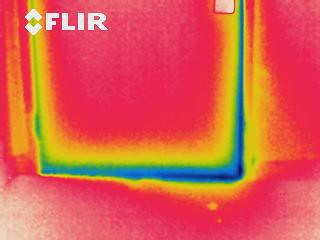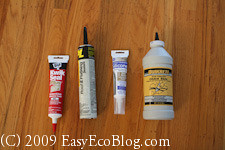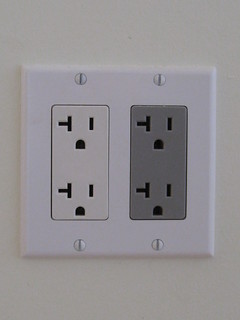| Cold Air Leak Under Door (Photo credit: CBC || Thermal) |
By Gates Dearen
Leaky faucets or roofs are easy to spot; it’s hard not to miss the water accumulating around the leaks. But how do you know if your house is leaking, letting hot air in and cold air out? You may not have thought much about this problem, but if air is leaking into or out of your house, it is literally money out the window! Windows and doors are probably the biggest culprits, as old and ill-fitting windows can lead to drafts throughout your house. While it’s best to have a window-and-door professional come out and take a look, there are simple ways you can check for yourself. Here are some places to look for air leaks.
Leaky faucets or roofs are easy to spot; it’s hard not to miss the water accumulating around the leaks. But how do you know if your house is leaking, letting hot air in and cold air out? You may not have thought much about this problem, but if air is leaking into or out of your house, it is literally money out the window! Windows and doors are probably the biggest culprits, as old and ill-fitting windows can lead to drafts throughout your house. While it’s best to have a window-and-door professional come out and take a look, there are simple ways you can check for yourself. Here are some places to look for air leaks.
Seals
Are the seals around your windows and doors in good repair?
Make sure they are tight and intact. Seals can dry out and crack, making them
ineffective, especially in the Florida
heat and sun. A quick inspection will let you know if it’s time to replace
them. Similarly, if you have caulk around your windows, or window air
| Caulk -Sealers-Fillers |
conditioning units, make sure it forms a good bond with no cracks or gaps. Also
check the frames. If light comes through your window or door frames, air is
getting through, too.
Windows
Try to gently rattle your windows. Movement can indicate leakage.
If your windows are old, or of poor quality, they are not keeping the inside
air in and the outside air out. The only real remedy for this problem is
replacing the windows with newer, more energy-efficient ones. It may seem like
a big investment up front, but you will begin to see savings in your cooling
and heating bills immediately, and you’ll be much more comfortable.
Doors
What are your doors made of? If you don’t know, find out. A
good quality door is usually made of steel or fiberglass, although there are
some other materials that will work well to act as a weather barrier, important
for keeping wind and rain, as well as heat, outdoors. Try the “rattle test” as
suggested above in the window section. If it moves, the door probably leaks. Make
sure the threshold is secure and properly placed so as not to let any air get
in or out at the bottom of the door. If you do have a gap, try placing a
draft-stopper along the bottom of the door until you are able to fix it. Also
check your doorknob and lockset to be sure it is fitted properly to the door.
Unexpected places
The above-mentioned sources of air leaks are the most
prevalent, but have you thought about how much air could be getting in or out
around your switch plates and outlets? Chimneys? Outdoor faucets? These
less-obvious sources can be big air-suckers! You may want to call in a
professional to check your entire house, including roof and foundation/house
juncture, for leaks, but in the meantime, you can do a relatively simple check.
BUILDING PRESSURIZATION
TEST*
If you are having difficulty
locating leaks, you may want to conduct a basic building pressurization test to
increase infiltration through cracks and leaks, making them easier to detect:
1) Turn off all combustion appliances such as
gas burning furnaces and water heaters on a cool, very windy day.
2) Shut all windows, exterior doors, and
fireplace flues.
3) Turn on all exhaust fans that blow air
outside, such as your clothes dryer, bathroom fans, or stove vents, or use
a large window fan to suck the air out of the rooms.
4) Light an incense stick and pass it around
the edges of common leak sites. Wherever the smoke wavers or is sucked out of
or blown into the room, there's a draft. You can also use a damp hand to locate
leaks; any drafts will feel cool to your hand.
Other air-leak detection
methods include the following:
·
Shining
a flashlight at night over all potential gaps while a partner observes the
house from outside. Large cracks will
show up as rays of light. Not a good way to detect small cracks.
·
Shut a
door or window on a dollar bill. If you can pull the dollar bill out
without it dragging, you're losing energy.
(*http://energy.gov/energysaver/articles/detecting-air-leaks)
As I said at the beginning of this article, if your house is
leaking, it’s costing you money. Well-fitting, well-constructed windows and
doors and frames will make the biggest difference in stopping air leakage, but
taking care of smaller leaks in less-obvious places can add up to additional
energy savings and greater comfort.
Gates Dearen is the co-owner of HomeRite Windows and
Doors in
Jacksonville, Florida. Owners Gates Dearen and Richard Walden
have been serving the building products industry in Florida for
over 25 years. We know the products, the industry, the market and
what adds great value to a home. Our
approach is a little different. We strive to
match the homeowner with the right windows for their home
and budget. Home improvements can be a hassle. We’re here to make life easier with
first-rate, energy efficient products; affordable prices; strong
warranties and expert, award-winning installers that provide excellent service
while respecting your home as if it were their own.
Related articles
















I'm glad I read this before my wife. She'll add it to her honey-do list. Maybe I'll just surprise her and get it done this weekend. Great informational tips!
ReplyDeleteYikes! The house has sprung a leak. Man the pumps.
ReplyDeleteNever thought about leaks coming from switch plates. Time to switch plates or fill the cracks.
ReplyDeleteThanks for such a nice post.
ReplyDeleteDouble Sliding Patio Doors
Windows And Doors Las Vegas
Replace Glass Sliding Door